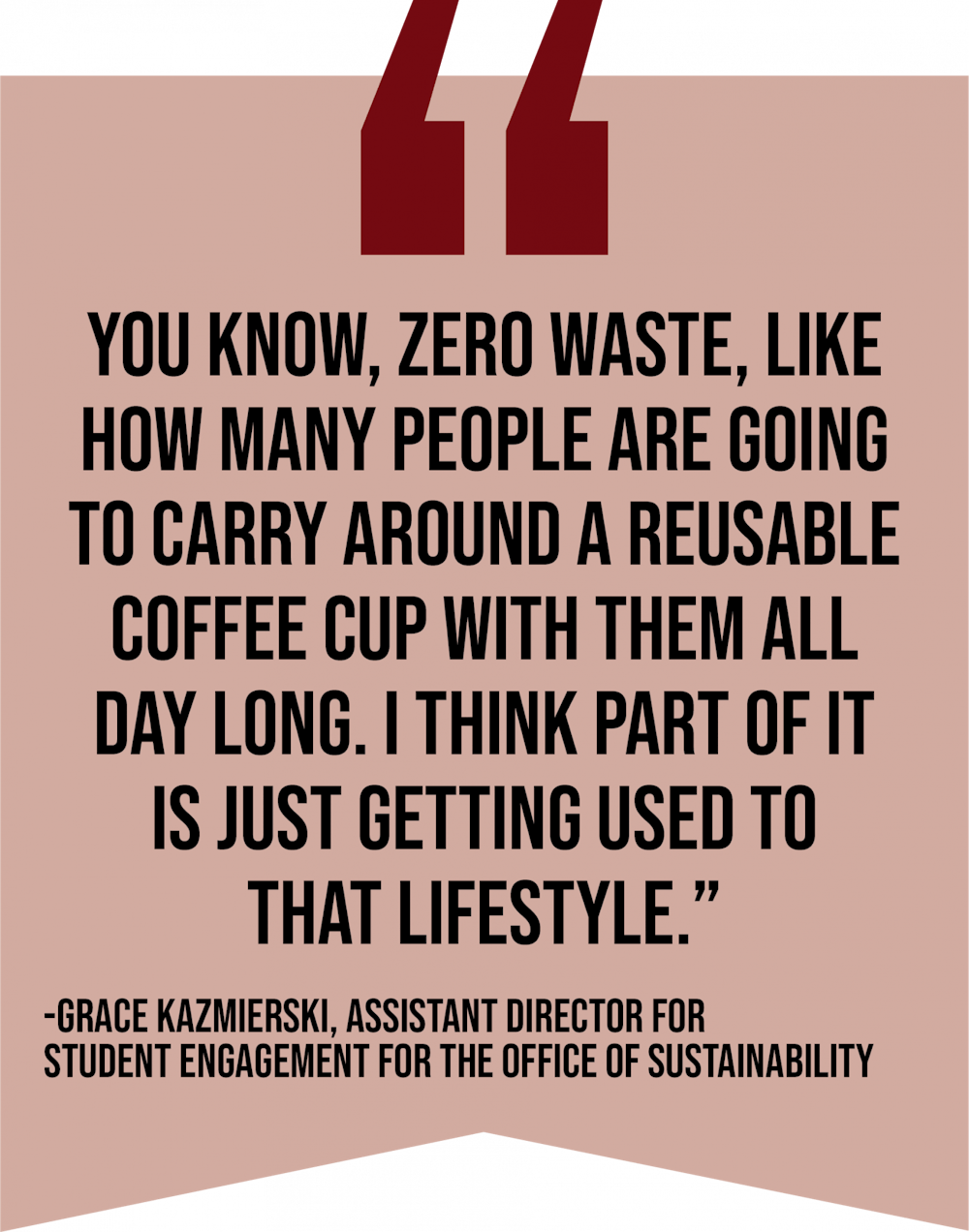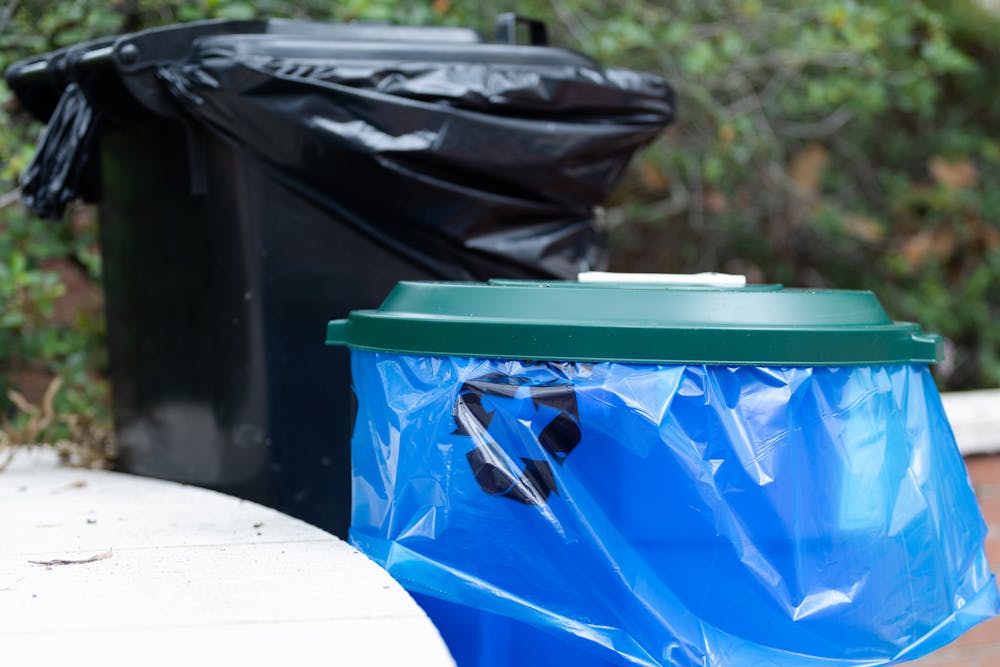Saving the environment can be simplified down to three simple steps for many people: reduce, reuse, recycle. But the process isn't as simple at USC.
The plastic cup you put in a blue can with three chasing arrows has a long way to go before becoming a new cup. It must be collected, cleaned, sorted and delivered before it even has the chance of starting the recycling process.
This process is one that Larry Cook, the director of the Office of Sustainability, is very familiar with. Before moving to the sustainability office in 2019, Cook worked in facilities for seven years managing the waste and recycling program.
Although recyclable materials are placed in single containers across campus, Cook said these materials can't be mixed when they are delivered to a company to be broken down and reused.
This is part of a long history of recycling throughout the US where, as materials have changed, it has become less cost-effective for recycling companies to accept items mixed together, according to Cook.
The materials are difficult to sort, so companies stopped accepting mixed items and became stricter about taking items contaminated by food or drinks.
Cook said this forced USC to make a change in how the university handles recyclable materials.
USC now runs their own material recovery facility, or MRF, where staff members collect, sort and clean the items that are put in recycling bins across campus before delivering them to a manufacturer.
“Because if it's not getting to that point where it's bouncing off as a product somebody will buy, all that other effort is completely worthless,” Cook said.
The university’s recycling program is one of the sustainability office’s most hands-on programs, relying on student and staff participation. It is the face of a large and often complicated system behind the scenes as the Office of Sustainability works toward its wider sustainability goals.
The office has implemented multiple systems to try and streamline the system and reduce waste. Cook said they have color-coded bags to make the transport of recyclable materials easier, improved signage and increased composting options.
The Sustainable Carolina program, which is lead and organized by students, also hosts events like DIY workshops for reusable products, trash pick-ups and clothing swaps to encourage students to be more sustainable.
However, Abby Vascsinec, a fourth-year finance and marketing student and the project coordinator for Sustainable Carolina’s Zero Waste Team, said that for some students, these efforts are still not enough.
“I think obviously we all understand the main scope of what recycling is," Vascsinec said. "But like, it's so hard to distinguish between what is and isn't recyclable these days. As much as our trash bins and stuff are labeled, there's really no incentive to recycling. So I think it's difficult for students to understand how important it is."
The convenience of non-recyclable items is another significant struggle, Grace Kazmierski, the assistant director for student engagement said.

“You know, zero waste, like how many people are going to carry around a reusable coffee cup with them all day long,” Kazmierski said. “I think part of it is just getting used to that lifestyle.”
Kazmierski said she encourages students to see how sustainability relates to their major and hopes that the programs that Sustainable Carolina and the Zero Waste Team put on help students realize their impact.
“You know, is it going to a trash pickup? Or is it, going into a trash pickup and then realizing that you have a part in that and that you can make changes in your life so that we're preventing those trash items from being there,” Kazmierski said.
The Sustainable Carolina organization and the events it hosts across campus are all part of the Office of Sustainability’s efforts to encourage students and administration to be more invested and involved with sustainability on campus.
This past year, the university had its highest waste diversion rate at 31%, meaning 31% of waste was prevented from going to landfills and instead diverted to recycling plants or other sustainable options. However, this is still far from the university's goal of a 45% waste diversion rate by 2025. Cook said that the 45% goal, which was noted in an “annual” report most recently conducted in 2017, is an aspiration.
“In order to have a goal, you've got to have a way to get there,” Cook said. “When it comes to the waste diversion goal that again, was not based on, ‘Here's where we are’ … there are a couple of ways that we could achieve that but we're not quite in the defined pathway stage.”
Cook hopes that new initiatives, like reviving a President’s Council on sustainability and drafting a new sustainability plan, could help integrate further sustainability practices throughout the university.
“We have never had trustee-level approved sustainability goals. And so all these goals up to this point have been kind of what the office feels like with input from stakeholders, but there was never any kind of built-in accountability,” Cook said. “That's what we'd like to work towards, so that there's a little bit of urgency beyond what's going on in the world, and it's not just us kind of screaming out to an empty room.”
Vascsinec said she appreciates the university’s efforts to get involved through programs like the President's Council on Sustainability and hopes to see more students get involved with sustainability programs on campus so they can reach their goals.
“From a very young age, I noticed the toll that human actions, combined with climate change, are taking on our natural resources,” Vascsinec said. "So as soon as I got to college, I knew this is going to be my life goal. I'm going to do whatever I can to clean this place up.”
Students of any year or major can get involved in Sustainable Carolina's zero waste effort and learn more from its Instagram.

